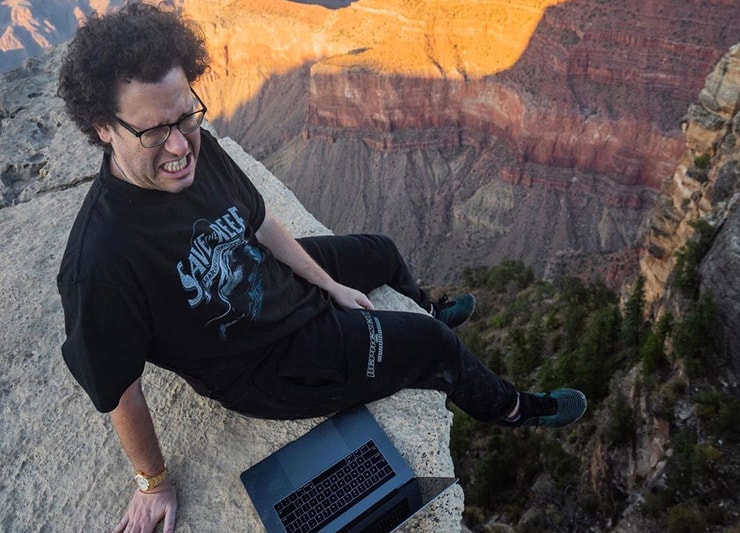In a hot market it doesn’t matter…
You’re likely to get paid…
In 2020 I saw some of the most reckless and degenerate traders make money.
But when things go south each one of those flaws gets exposed.
And that’s exactly what happened to them in 2022 when stocks plummeted.
Consistency is key if you want long term success.
But there’s one thing that’s non-negotiable.
Without it, your chances of beating the odds and being a profitable trader nearly vanish.
I’m going to show you where traders mess this up…and how to fix it.
If you have any aspirations of being my next millionaire student…
Then you’ll want to listen to this carefully.
Table of Contents
Top Traders All Possess This Behavior

2025 Millionaire Media, LLCI was in college in 2000, making money hand over fist.
I thought I was a stock trading prodigy.
After all, I was receiving loads of media attention after making $1M by the age of 21.
Looking back now, it’s easy to see that a large portion of my success was due to catching a hot market.
I quickly realized that if I wanted to achieve long term success that I couldn’t rely on a favorable market to make money.
Plus, we never can control how the markets will react.
In order to continue to thrive, I had to improve my discipline.
Without discipline your chances of making it in this game are slim to none.
I’ve mentored over 30 of my students on their journey to seven figures, two have gone on to make eight figures.
And after 15 years of coaching I’ve found five roadblocks that ruin traders’ discipline.
Here they are…
#1 Lack Of A Trading Plan

2025 Millionaire Media, LLCEach morning I send out a watchlist to my Challenge students.
I explain to them the stocks I have my eyes on, the potential setup, and why I like them.
Now, that doesn’t mean I will trade these stocks. But I have them on my radar.
I’m also looking at hot sectors and keeping my eyes peeled for any news catalysts with stocks in those sectors.
Bottom line…you can’t go into the trading day without some sort of plan.
Without a focus list you’re likely to trade random stocks and get random results.
Narrowing your focus is the first step in planning.
You also want to plan your trades.
Many of my top students won’t go into a trade without having a specific entry and exit in mind.
They all know my number #1 rule: Cut Losses Quickly.
More Breaking News
- BigBear.ai’s Journey in the Stock Market: Rising Trends and Challenges
- Top Bitcoin Stocks to Watch Under “Crypto Emperor Trump”
Without this, you’re likely to make impulsive decisions based on emotions rather than making calculated decisions.
#2 Overconfidence

2025 Millionaire Media, LLCAfter stringing together several six-figure months in 2000, I started doing some math in my head. If I can make $150K a month for the next few years I’ll have millions stacked on millions.
Again, this was really foolish thinking on my part. Of course, the markets weren’t going to remain that hot forever.
However, my cockiness led to some big trading losses after.
But it was a great lesson for me.
That’s why when the markets crashed in 2008 and in 2021…I already had perspective.
In fact, I warned traders about the latest crash. Not because I am a genius…but more so that I’ve seen how bubbles played out in the past.
Being confident is a good thing in trading. Having overconfidence can be destructive.
You can’t control how stocks will react. But you can control how much you want to risk.
Stay humble…swing for singles…focus on being disciplined and consistent.
#3 Overly Emotional

2025 Millionaire Media, LLCImagine if real estate traded like stocks.
It would never happen right?
Today the price of this property is worth $1M and tomorrow it’s worth $700K…
You never see it because it’s not logical.
But that’s not how stocks work.
For example, shares of UPS are down about 10% this week. Has that much changed with the United Parcel Services?
Unlikely…
But the stock market is driven daily by the emotions of traders. Fear and greed dominate.
How else can you explain triple-digit moves in a single day?
Don’t get me wrong…I love Supernovas…but these stocks aren’t moving off fundamentals.
Fear and greed can cloud your judgment. Fear can lead to hesitation and missed opportunities…while greed can lead to taking excessive risks and ignoring risk-management rules.
Sticking to your trading plan and respecting your risk rules is one way to keep your emotions in check. But honestly, I like to trade scared. For me, it keeps me focused.
#4 Lack Of Patience

2025 Millionaire Media, LLCYou’re in front of your screen…and the ticker symbols are flashing red and green. The money is out there for someone to take it…right?
Again, if you’re taking random setups and jumping in and out of trades without a plan…you’re likely going to get subpar results.
It’s hard to sit on your hands.
But you have to stop treating the stock market like a casino.
It’s not about the thrills or the action. That’s why it’s important you realize what setups work best for you.
After 20 years…I have developed several that I like to go back to. They include the weekend trade and Supernovas.
By knowing what your best setups are…you are likely to stay more disciplined.
Also, you want to figure out what your best times are. You don’t want to become one of those traders who stares at their screen all day and is missing out on life.
There’s more to life than just trading. That’s why you want to be efficient with your time.
#5 Poor Risk Management

2025 Millionaire Media, LLCIn a hot market taking huge losses isn’t a big deal because you know you’ll get a chance to get it back in another play.
But now, with things slow…A big loss could take days, weeks, or even months to recover from.
That’s why you must understand the market we’re in and adjust your risk accordingly.
Also, you want to make sure winners are larger than your losers.
You can’t be making $0.20 on a trade but then be willing to lose $0.35 on a trade. You’d need nearly 2 winners for every one loser just to break-even if you manage risk like that.
Know your numbers…many of my top students like Kyle Williams keep detailed records of their trading stats.
It gives them insight on when they should be trading bigger or smaller…taking on more risk or less.
I like using Profit.ly…it’s an easy way to keep track of my numbers.
Final Note

2025 Millionaire Media, LLCA lot of traders got exposed in 2022 and 2023. The markets changed and without discipline their big gains in 2020 started getting wiped out.
While it’s a difficult market for traders…it’s a great one for those just starting their journey. You want to gain experience in a market like this because when things pick up again you’ll be primed to take advantage of it.
Discipline…you hear it a lot. But you need it if you want any chance to take your trading to the next level.
If you’d like to learn more about my program then here’s the link.



Leave a reply